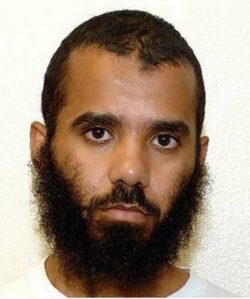The D.C. Circuit on Tuesday (Aug. 7) rejected a challenge from a Guantanamo prisoner who argued that the government no longer has the authority to hold him indefinitely. In a significant validation of the president’s continued detention of enemy combatants who were captured shortly after Sept. 11, 2001, the court declined to impose a time limit on the detention authority despite the fact that the conflict in Afghanistan has changed markedly over the last 17 years.
Moath Hamza Ahmed Al-Alwi, a Yemeni citizen who grew up in Saudi Arabia, was captured in December 2001 during American operations in Afghanistan. The government accused him of supporting Osama bin Laden, and it detained him at Guantanamo Bay, Cuba, where he remains. He is one of the so-called “forever prisoners,” a group of Guantanamo detainees who have never been charged with a crime but are deemed too dangerous to release.
Al-Alwi has twice argued to the D.C. Circuit that his continued detention is illegal. In 2011, the court denied his first petition for habeas corpus, upholding a district judge’s finding that he was properly classified as an enemy combatant because he was “part of or supporting the Taliban or al Qaeda” during the start of hostilities in Afghanistan.
In 2015, Al-Alwi filed a second petition, this time contending that the government’s authority to detain him has run out. He made two arguments. First, he pointed to “traditional law of war principles,” which a plurality of the Supreme Court invoked in Hamdi v. Rumsfeld as a basis for the president’s authority to detain suspected terrorists during the war against al Qaeda. Al-Alwi said those traditional principles have unraveled due to the war’s duration and scope. The war, he argued, has become so unprecedented that traditional law of war principles can no longer justify his continued—and potentially lifelong—detention.
Second, he argued in the alternative that the original Afghanistan conflict, which provided the initial basis for his detention, is now over. Under the Authorization for the Use of Military Force, which Congress passed one week after Sept. 11, 2011, the government may detain enemy combatants for the duration of hostilities against the Taliban and al Qaeda. Al-Alwi said that the American military’s current operations in Afghanistan are not the same conflict as the one during which he was captured. For instance, he noted that President Obama declared the end of the initial Afghanistan operation, known as Operation Enduring Freedom, in 2014.
A district judge rejected both arguments, and on Tuesday, in Al-Alwi v. Trump, the D.C. Circuit rejected them as well. In an opinion by Judge Henderson (joined by Chief Judge Garland and Judge Griffith), the court said the government’s authority to detain Al-Alwi has neither “unraveled” nor expired. Al-Alwi did not provide controlling authority to support his theory based on traditional law of war principles, Henderson wrote, and the changed nature of the conflict in Afghanistan does not defeat the government’s detention authority. The American military remains engaged in hostilities against Taliban and al Qaeda forces in Afghanistan, and that’s enough for the AUMF’s detention authority to persist, the court concluded.
![]()

